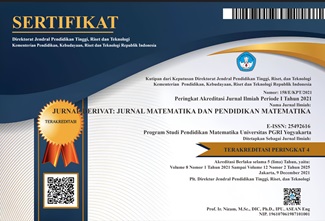Pengembangan Perangkat Pembelajaran Menggunakan Model Problem Posing Berorientasi Kemampuan Pemecahan Masalah Matematis
DOI:
https://doi.org/10.31316/j.derivat.v8i1.1497Abstract
This study aims to describe the level of validity of mathematics learning tools using the Problem Posing model oriented to mathematical problem solving abilities on statistics which has been tested valid. The development model in this study uses the Plomp model which has three stage, namely the Preliminary Research Phase, the Prototype Phase, the Assessment Phase. The data collection techniques used were the validation of learning tools. The data collection instrument used was a validation sheet. The data analysis technique used is descriptive statiscal analysis technique. The result of the research validation analysis by three validators obtained an average validation every RPP of each validator was 100% for aspect of indicator one as measured by guttman scale of which are very valid criteria and 80,36% for aspect of indicator two to seven as measured by likert scale of which are valid criteria, and for the average validation every LKPD of each validator was 93,33% for aspect of indicator one as measured by guttman scale of which are very valid criteria and 75% aspect of indicator two to three as measured by likert scale of which are valid criteria. Based on the results of this study it can be concluded that the development of learning tools using the Problem Posing model oriented to the mathematical problem solving abilities has been tested for its validity.
Keywords: LKPD, RPP, Problem Posing
Downloads
Published
Issue
Section
License
Authors who publish with this journal agree to the following terms:
-
Authors retain copyright and grant the journal right of first publication with the work simultaneously licensed under a Creative Commons Attribution-ShareAlike 4.0 International License that allows others to share the work with an acknowledgment of the work's authorship and initial publication in this journal.
- Authors are able to enter into separate, additional contractual arrangements for the non-exclusive distribution of the journal's published version of the work (e.g., post it to an institutional repository or publish it in a book), with an acknowledgment of its initial publication in this journal.
- Authors are permitted and encouraged to post their work online (e.g., in institutional repositories or on their website) prior to and during the submission process, as it can lead to productive exchanges, as well as earlier and greater citation of published work (See The Effect of Open Access).







